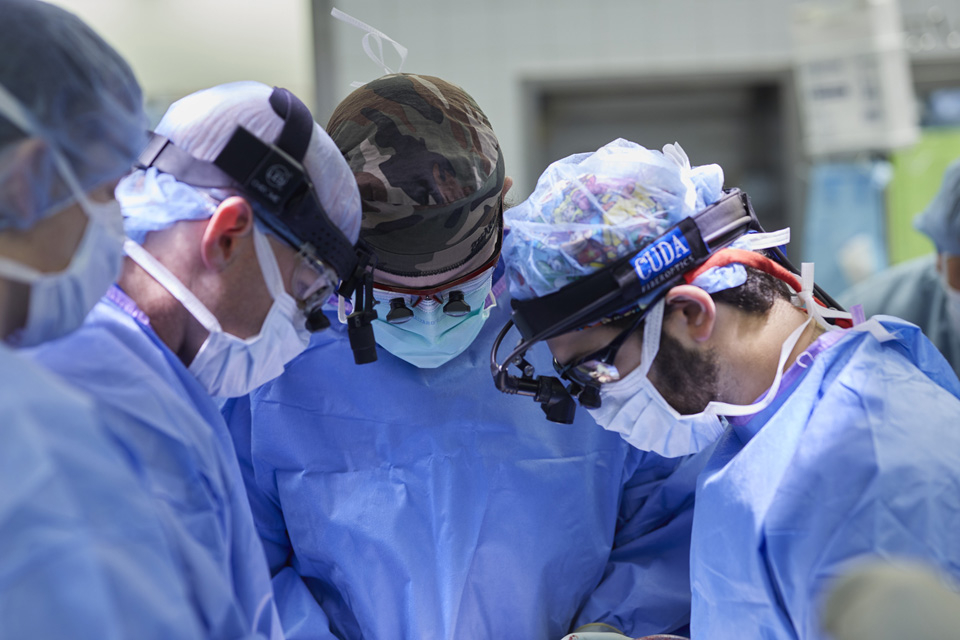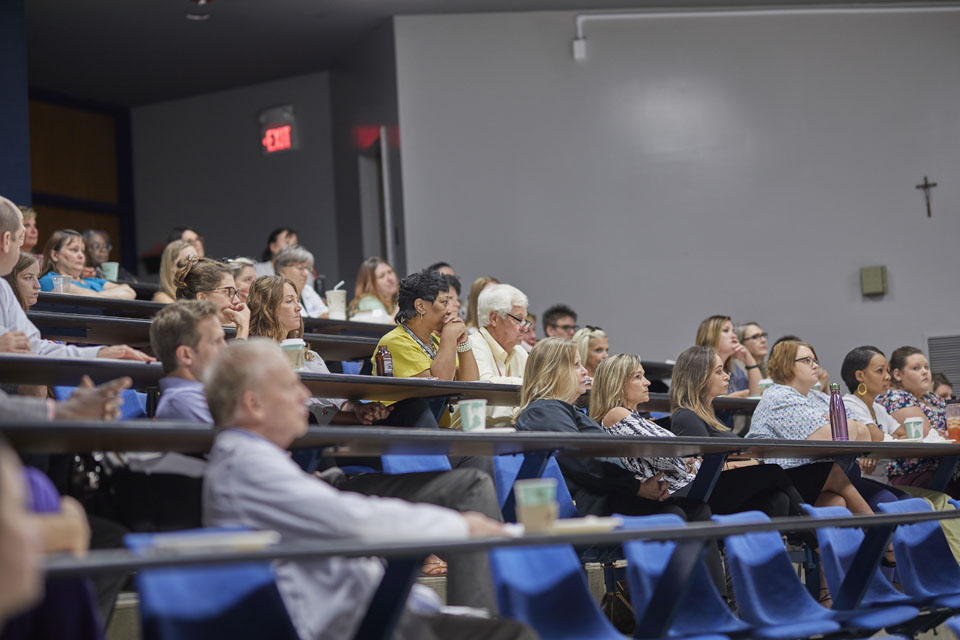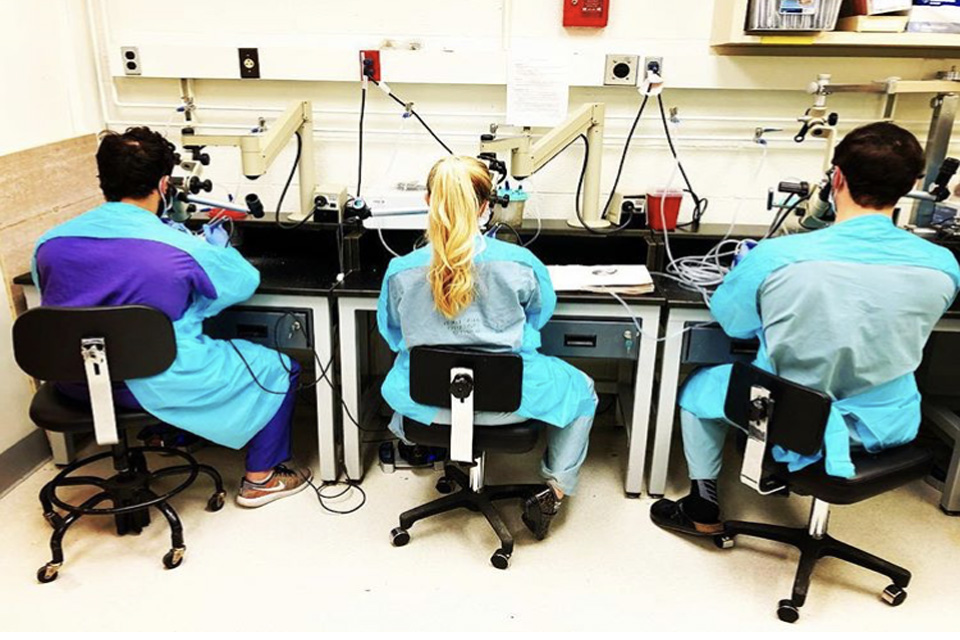Otolaryngology Research
The Saint Louis University Department of Otolaryngology encourages SLU students and faculty to work side-by-side as they pursue research.

The Department of Otolaryngology-Head and Neck Surgery at Saint Louis University actively participates in multiple facets of research including bench work, translational, and clinical research that aims to improve the understanding of disease processes and patient care for a variety of otolaryngological conditions. The results of our research are published in scientific journals and accepted as oral or poster presentations at national and international meetings.
The research conducted in our department is performed by our clinical faculty, otolaryngology residents, adjunct research faculty, and medical school students with a propensity to the study of disorders of the head and neck. The dedication this group brings to research in otolaryngology allows us to approach patients with the highest level of care and the most cutting-edge treatments.
Research Areas
Student Research
Saint Louis University's Department of Otolaryngology is well known for its research endeavors. The department is conducting over 45 studies, and in the past five years, has published more than 100 manuscripts. SLU School of Medicine students can partner with our faculty and residents on a research project. Past projects have resulted in published manuscripts and presentations at regional and national conferences.
How to Apply
Research project assignment is done on a first-come, first-served basis through the
department research coordinator. Projects will be capped at two if a waitlist of interested
students exists. There is no guarantee of project assignment, nor can an estimated
timeline be provided.
Applicants must submit an otolaryngology student research application and provide a copy of their most recent resume/CV. Please submit a complete application
and send all pertinent supporting materials.
Preferred prerequisites to research involvement are:
- ENT Case Challenge or CV with detailed research experience
- Faculty Shadowing (x3) or OASIS Otolaryngology Course
Post-Assignment
Once assigned a project, you are responsible for obtaining and providing proof of SLUSOM approval for your involvement. This applies to every type of research project (i.e., IRB, database, case report). Please coordinate your approval with the otolaryngology research coordinator.
Contacts
Thomas Hoag
ENT case challenge
thomas.hoag@health.slu.edu
Tina Vandever
Shadowing
tina.vandever@slucare.ssmhealth.com
Deniece Webb
Research coordinator
deniece.webb@health.slu.edu
SLU Otolaryngology has a diverse range of clinical research activities. As a vital component of the department’s clinical mission, our research projects and initiatives covers otologic disorders, vestibular, voice and speech, sinus and nasal disorders, pediatrics, facial plastic and reconstructive surgery, and head and neck cancer.

The Department of Otolaryngology-Head and Surgery has a growing epidemiology research
core. Our team oversees all aspects of epidemiology research outcomes focusing on
head and neck cancer prevention, early detection, control, survivorship, and quality
of life. Through the AHEAD Institute, Matthew Simpson, data analyst, supports the research efforts of faculty, residents
and medical students.

The Department of Otolaryngology-Head and Neck Surgery partners with several innovative
bioscience research laboratories at Saint Louis University School of Medicine to support
resident training and faculty research. The integrated team of adjunct and collaborating
faculty with cutting-edge laboratory resources joining our department increases resident
and medical student exposure to basic science and translational initiatives.
SLU Adjunct Faculty
- Rajeev Aurora, Ph.D.
Associate Professor, Molecular Microbiology and Immunology - Ratna Ray, Ph.D.
Professor, Department of Pathology
SLU Collaborating Faculty
- Guangyong Peng, M.D., Ph.D.
Professor, Department of Infectious Diseases
Basic Science Research Highlights, Department of Otolaryngology
General Otolaryngology
Role of FOXP3+ CD4+ and FOXP3+ CD8+ T regulatory cells in obstructive sleep apnea
Principal Investigator: Thomas Sanford, M.D.
Vision Statement
Saint Louis University's Department of Otolaryngology-Head and Neck Surgery will produce high-quality nationally-recognized research to advance our field.
Mission Statement
The Department of Otolaryngology at Saint Louis University aims to produce clinical and epidemiologic research directed at improving the quality of life of patients in our field. We seek to advance knowledge in otolaryngology, define cutting-edge treatments, and improve patient outcomes. Our mission requires the commitment of our faculty, residents, and staff. We strive to promote productive partnerships within and across fields, and we will work in an ethical, honest manner to expand the boundaries of otolaryngology knowledge and practice.
Mandatory Responsible Conduct of Research Training
The National Science Foundation and National Institutes of Health require training in Responsible Conduct of Research (RCR) for programs supporting research training, career development or research education.
All students, postdoctoral fellows and trainees at Saint Louis University supported by external funds must receive at least eight hours of formalized RCR training. To meet this requirement, Saint Louis University provides a series of two-hour workshops throughout the year. Training should be completed by the end of your program. Attending at least four workshops puts you in compliance but attending more is always encouraged. Training should be completed by the end of your program.